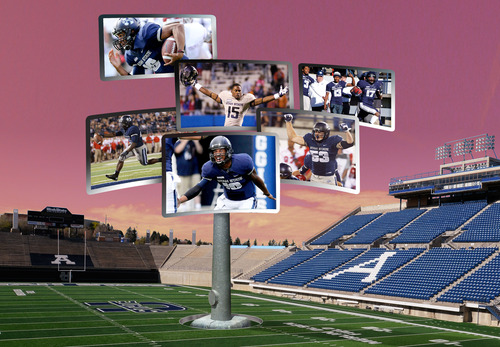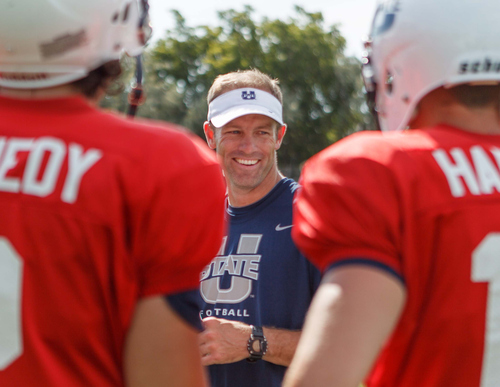This is an archived article that was published on sltrib.com in 2013, and information in the article may be outdated. It is provided only for personal research purposes and may not be reprinted.
There's nothing quite like having your feet planted in the stands at Romney Stadium, with hard-hitting football in front of you and a raucous crowd around you.
Official visits on game days have an effect on Utah State recruits that can't be replicated. Young fans who experience the sport there for the first time often find themselves Aggies for life.
Now, USU has an opportunity to extend that outreach to a much larger audience. With no fewer than six games on national television this fall — the most in school history — the Aggies will be playing in front of millions instead of thousands. School officials call it a game-changer for an athletics program that was struggling only a few years back.
"It's what we hoped for when we joined the Mountain West," athletic director Scott Barnes said. "We had aspirations of moving into this position, and while it's hard to project, we did have belief, we had faith that we'd get there."
While basketball success has been a feather in Utah State's cap for years, its recent football ramp-up has delivered increased exposure and great benefits for the football program and university at large. And there's going to be a lot more of it this season.
CBS Sports Network, the Mountain West's main television partner, is carried in 48 million homes and will air five Utah State games, including four contests at Romney Stadium. ESPN has picked up two games to air on its networks, the first of which is a prime-time Friday game at San Jose State. The other may air on one of ESPN's television networks or online on ESPN3. Two more games, against Pac-12 opponents Utah and USC, will likely be on as well, but details are still forthcoming.
Utah State has taken advantage of a national stage in years past, most recently decimating Toledo in the Idaho Potato Bowl in front of 2.8 million viewers tuned into ESPN. The Aggies also topped Utah last season on ESPN2, and fell in a close game with BYU on ESPN in front of a combined 3 million viewers.
The Aggies aren't shy about their desire to be on the screen: USU football coach Matt Wells says his team approaches every game the same way, but acknowledged that the increased exposure is critical for the continued growth and development of the program.
"Everything we do is geared toward building and recruiting into our brand," Wells said. "The games on CBS Sports Network, ESPN, and even when you have guys taken in the NFL Draft — that all brings exposure to our program. It plays a huge part in what we want to accomplish."
Utah State's television haul is still small potatoes compared with Utah and BYU.
Next season, the Utes will make around $15 million from their Pac-12 television deal (and more than $20 million when they become a fully vested member in 2014-15). BYU football's deal with ESPN will pay the Cougars between $8 million and $10 million. Mountain West teams will make between $1 million and $2 million per school.
But while the money is important, the national exposure may be more crucial for a university that is still trying to get out of the shadow of the Courgars and the Utes. Even the football team's success in the WAC has made a difference to people who are just learning about the Aggies.
Utah State's admissions office makes dozens of trips every fall all around the country. Especially in Western states, the Aggies' recent football rise and increased profile has at least increased name recognition: People from all over are realizing there's a third FBS school in Utah.
"We've found that more students are aware of Utah State, and because we do most of these trips in the fall, they're usually hearing about us through football," admissions official Tagg Archibald said. "That's not necessarily why they come to our university, of course. But the conversation has changed from, 'Have you heard of Utah State?' to 'What do you think of our team?' "
In football, winning is as big a factor as any into why a program can boom or bust, and it's frustratingly hard to predict in many instances. But however the Aggies' fortunes may go, they'll certainly have more chances to make an impact.
The Mountain West's concurrent deals with ESPN and CBS Sports Network run through the 2019-20 season. The conference seems to have stabilized, with 12 schools split into divisions with a conference championship game.
Utah State's future opportunities will be determined by how it plays. The Aggies know the more they win, the more airtime they'll get. And exposure is always good for a school still trying to make it into the national conversation.
"We're nowhere near our peak," Wells said. "It's a process we continue to invest in daily. Every day, we work to make sure our players can graduate from Utah State and compete for championships. And we hope people notice that." —
Fully exposed
USU football games on national networks, with others still to be determined
Sept. 7 at Air Force • CBS Sports Network
Sep. 27 at San Jose State • ESPN
Oct. 3 vs. BYU • CBS Sports Network
Oct. 12 vs. Boise State • CBS Sports Network
Nov. 2 vs. Hawaii • CBS Sports Network
Nov. 9 at UNLV • Unspecified ESPN network (ABC, ESPN, ESPN2, ESPNU, or online on ESPN3)
Nov. 23 vs. Colorado State • CBS Sports Network





